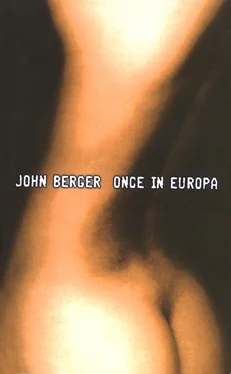John Berger - Once in Europa
Здесь есть возможность читать онлайн «John Berger - Once in Europa» весь текст электронной книги совершенно бесплатно (целиком полную версию без сокращений). В некоторых случаях можно слушать аудио, скачать через торрент в формате fb2 и присутствует краткое содержание. Год выпуска: 2014, Издательство: Bloomsbury Publishing, Жанр: Современная проза, на английском языке. Описание произведения, (предисловие) а так же отзывы посетителей доступны на портале библиотеки ЛибКат.
- Название:Once in Europa
- Автор:
- Издательство:Bloomsbury Publishing
- Жанр:
- Год:2014
- ISBN:нет данных
- Рейтинг книги:3 / 5. Голосов: 1
-
Избранное:Добавить в избранное
- Отзывы:
-
Ваша оценка:
- 60
- 1
- 2
- 3
- 4
- 5
Once in Europa: краткое содержание, описание и аннотация
Предлагаем к чтению аннотацию, описание, краткое содержание или предисловие (зависит от того, что написал сам автор книги «Once in Europa»). Если вы не нашли необходимую информацию о книге — напишите в комментариях, мы постараемся отыскать её.
Once in Europa — читать онлайн бесплатно полную книгу (весь текст) целиком
Ниже представлен текст книги, разбитый по страницам. Система сохранения места последней прочитанной страницы, позволяет с удобством читать онлайн бесплатно книгу «Once in Europa», без необходимости каждый раз заново искать на чём Вы остановились. Поставьте закладку, и сможете в любой момент перейти на страницу, на которой закончили чтение.
Интервал:
Закладка:
Men aren’t beautiful. Nothing has to stay in them. Nothing has to be attracted by any peace they offer. So they’re not beautiful. Men have been given another power. They burn. They give off light and warmth. Sometimes they turn night into day. Often they destroy everything. Ashes are men’s stuff. Milk is ours.
Once you’ve learnt to judge for yourself and are no more fooled by their boasts, it’s not hard to tell the man who deserves respect and the man who is pigshit. Yet the power of a man to burn, we discover only by loving him. Does our love release the power? Not always. I loved Stepan for many weeks before we lived IN EUROPA. He was burning when I met him on the footbridge.
Michel I started to love when we returned to the village. We never got to Paris. I can die happily without seeing the capital. We stayed for three nights at the mad hotel with the white geese and his room opposite the wardrobes. Then we came home.
Once in the factory Stepan and Michel worked on the same shift for three days, yet it’s in me they still meet. Marie-Noelle, Christian — embrace each other tonight, whatever happens, do this tonight, and know your fathers are embracing each other.
It is getting late and the light is already turning. The snow on the Gruvaz, facing west, is turning pink, the colour of the best rhubarb when cooked. I imagined we would come down to earth before it’s dark, but Christian must know what he’s doing. He’s a national instructor, he came second in the European Championship of Hang-gliding and when I said to him, they’ve both gone to Annecy, they needn’t know anything, need they? they won’t be frightened, take me up this afternoon, the time’s come, he simply replied: Are you ready?
Strange how I’m not cold. I can feel each toe and each finger, they’re warm as they were when I was a baby — I suddenly remember.
You take a man right into you and you cannot compare him or measure him or make a story of him. Everything that has ever been is swelling with the lips of the mouth into which you take him and he fills you, where you know as little as you know about an unborn child in your womb.
You can tell yourself other things about him when he has left, yet all of it remains far away compared to the places within you to which you lead him. Hay in the barn cannot change back into grass. If he’s burning, the places to which you have led him are flooded with light. In your belly there are stars and of these stars you may be a victim. Poor Clotilde gave birth in the stable all alone, the door locked on the outside by her father.
It is painful for us to judge the man we have taken, for he’s ours, already like a son. How can you judge a body which has been where he has been, who has come from there? Beside his single name all else is dead coals. How reluctant we are to judge! If we have to, if we are forced to, if we are picked up by the ears like a rabbit, we judge him and suffer the pain, the violence done to the sky within us where the stars shone. Men, poor men, judge more easily.
I never judged the life Stepan led before the Ram’s Run. All that happened before the 31st of December 1953 was beyond judgement or comparison, for it had brought him to me in shed A, IN EUROPA. Since his disappearance, he has stayed with me where I first took him and hid him, beyond ashes. He has stayed with me as the seasons stay with the world.
The furnaces which robbed Stepan of his life took away from Michel his legs and now they are taking away his hearing. At night when he unfastens the prostheses he is legless. The two stumps are the colour of molybdenum bread when it’s cooling before the spray rains on it. Only their colour is like molybdenum. The specific gravity of molybdenum, Michel once told me, is 95.5—one of the heaviest metals, less heavy though than uranium, tungsten or lead. Legless, he weighs fifty-nine kilos. The colour alone of the stumps is like molybdenum, for they, unlike that monstrous metal, are alive. I know with my fingertips where their tissue is sensitive and the nerves murmur, and where the scarred flesh is numb, giving off warmth and taking in no sensation. On his back are light scars where they took skin to graft onto his face. Perhaps you are kissing my arse! he joked once when I was licking by his ear.
Without his artificial legs he hops like a bird on crutches. There are evenings when he lets me serve him like a king. Other times he is irritable and glowering and he pushes me away and, seizing his crutches, hops round the room like a plucked turkey. If he hears footsteps, when he’s doing this, he flings himself onto the bed and pulls the sheet up to his grey beard. He has never let his daughter see him unharnessed. Passionately he wants his daughter to have an unmutilated father.
The wind is ruffling the sheet and the sheet is slapping like the washing in the orchard of my childhood when the bise blew. It won’t blow away, Christian, are you sure?
Often the burnt come to the shop to have their pain taken away. Michel insists on being alone with them, I have never seen what he does. Sometimes somebody asks him to go down to an accident in the factory. Once or twice he has succeeded in taking the pain away by telephone. Four years ago, Louis’s son, Gérard, was pruning an apple tree with a chain saw, standing on a ladder. Somehow he slipped and the chain saw, still turning, touched his neck before clattering to the ground. Blood was pouring out of a jugular vein into his shirt. He came running into the shop, his face like a sheep’s. Michel stopped the bleeding within a minute without touching the wound. Then he sent Gérard down to the doctor, who couldn’t believe his medical eyes.
Each time he takes away the pain he is exhausted afterwards, and, when I’m there, I massage the back of his neck and shoulders to give him relief. One night when I was doing this to him, he said: Paradise is rest, isn’t it? Repose. You go to paradise after you’ve worked three shifts running, twenty-four hours without a break. You stop and there’s the pure pleasure of stopping, doing nothing, lying down. Paradise is doing fuck-all. You don’t know anything else exists. No relations in paradise, Odile, no children, no women, no men. Undistilled egotism, paradise! Isn’t that it, my love? I went on massaging him and I felt his cart-horse shoulders relaxing, accepting. After a while he turned towards me, his eyes piercing me, and he pronounced my name. Then he took me in his arms, and he carried me, yes, he carried me to the bed and murmured: It’s only in hell, my love, that we find each other!
And Michel found me there on the bed. He found Odile.
Look, look down there — can you see? — there’s a heron flying. Tzaplia , the last message before nightfall.
Tell them, Christian, tell them when we land on the earth that there’s nothing more to know.
Play Me Something
What is it that men have and women don’t and which is hard and long?
On your left is the city of Verona, announced the bus driver over the loudspeaker. Verona was conquered by the Ostrogoths, later by the Barbarians, and still later by the Austrians. In the fourteenth century Verona was the setting of the love story between Romeo and Juliet.
What is it that men have and women don’t and which is hard and long?
Tell us! demanded the boys.
Military service!
The flatness of the surrounding countryside was unfamiliar, making it difficult to judge distances. The coach was traveling fast, yet it seemed that time passed and nothing changed.
You see their maize? They’re two months ahead of us.
Finally the coach crossed the motor causeway to the Queen of Cities. In the vaporetto the men stood up very straight, as if on parade. This was because they were reminded of the first time they had left the village as conscripts in the army. The women lounged on the deck seats, and the younger ones pulled up their skirts to bare their legs to the sun. The vaporetto swayed first to one side and then to the other, like a woman pedaling very slowly on a bicycle.
Читать дальшеИнтервал:
Закладка:
Похожие книги на «Once in Europa»
Представляем Вашему вниманию похожие книги на «Once in Europa» списком для выбора. Мы отобрали схожую по названию и смыслу литературу в надежде предоставить читателям больше вариантов отыскать новые, интересные, ещё непрочитанные произведения.
Обсуждение, отзывы о книге «Once in Europa» и просто собственные мнения читателей. Оставьте ваши комментарии, напишите, что Вы думаете о произведении, его смысле или главных героях. Укажите что конкретно понравилось, а что нет, и почему Вы так считаете.












